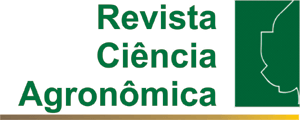Adaptability and stability the grain sorghum genotypes (DKB 860, DBK 57, 822, SHS 400, 741, AG 1018, BR 304, SAARA and 740) were evaluated at seven environments of the state of Ceara, from 2002 to 2004. It was, used the linear regression coefficient (β) as an estimate of adaptability, and the deviations mean squares from the regression (σ²), as a measure of stability of according with the model proposed by Eberhart and Russell. It was observed statistically significant (p < 0.01) regarding the effects of environment, genotype, and genotype x environment interaction. The genotype DKB 57 has requirements of a desirable genotype, with (β = 1.25 and R² = 96.44) indicating that its grain yield increase with the improvement of the environmental conditions and has a high coefficient of determination thus ensuring its stability. It also used the method of Cruz to justify and confirm the effect of genotype x environment interaction in order to provide a recommendation with more security for the genotype SHS 400 that presented a high average, B1 <1 and b1 + b2> 1, among the materials evaluated. The yield stability of the genotypes AG 1018 and SAARA it is an interesting alternatives for recommendation to farmers of the state of Ceara. The yield stability of the other genotypes indicates that they are little adapt tied to the environmental conditions in the state of Ceara.
Sorghum bicolor; Cultivar; Breeding



